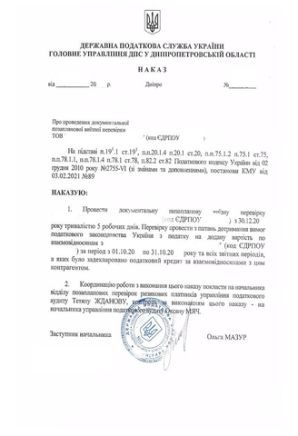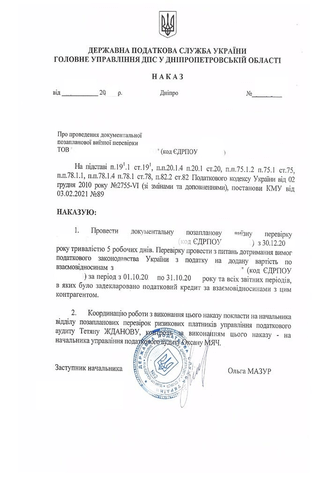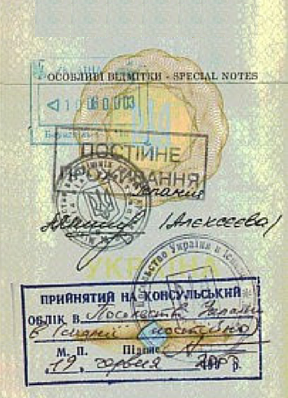Tax Audit After Closing an Individual Entrepreneur
Cost of services:
Reviews of our Clients
... our work on joint projects assured us of your high level of professionalism
With the introduction of martial law, many Ukrainians have relocated abroad. To avoid double taxation, they often formalize their permanent residency in another country and, as part of this process, decide to close their individual entrepreneurial status in Ukraine. However, many entrepreneurs mistakenly believe that the final step is merely a formal procedure in the registry. In reality, ceasing entrepreneurial activity marks the beginning of a new phase of responsibility toward the state.
Entrepreneurs are often unaware that after closing their business, they will need to undergo a tax audit, prepare extensive documentation, and address complex issues, such as obtaining statements from closed bank accounts. Our clients—entrepreneurs who prioritize their time and peace of mind—often seek our assistance to resolve these matters efficiently and without stress. Common concerns include:
- What steps must be taken after closing a business to avoid fines, penalties, risks, or potential legal proceedings?
- What documents are required to prepare for a tax audit after business closure?
- How to close a business remotely while living abroad?
You may have already faced challenges, such as obtaining bank statements from overseas or dealing with lengthy tax audits that can extend over years due to incomplete preparation. How can you ensure a smooth and trouble-free closure of your business, even from abroad, and eliminate future tax-related issues? Read on to learn from our experienced legal experts how to manage this process correctly.
You might also like: Relocating a Ukrainian Individual Entrepreneurial Business Abroad: What to Do About Taxes?
What Responsibilities Remain After Closing an Individual Entrepreneurial Business, and How to Fulfill Them?
Closing an individual entrepreneurial business does not end the entrepreneur’s obligations to government authorities. Why? After officially ceasing operations, the entrepreneur must ensure final tax settlements and submit a final tax return detailing income earned during the business's active period.
Subsequently, the tax authorities will conduct an audit of the closed business to confirm that all obligations have been properly fulfilled. This audit is typically initiated in one of two ways: either the entrepreneur submits a written request to initiate the process, or the tax authorities send a notice to the taxpayer’s electronic cabinet or email, requesting specific documents. Key documents commonly requested for a post-closure tax audit include:
- Contracts related to services provided or work performed during the business's operational period.
- Completion documents, such as service reports, invoices, or delivery notes, to confirm the services or goods provided.
- Payment records, detailing whether transactions were conducted in cash or through non-cash methods.
- Income ledger, the primary document tracking all income generated during the business’s operations.
Employment contracts and records of wage calculations and payments, if employees were hired.
Bank statements showing the movement of funds in various currencies, serving as evidence of income and expenses.
Please note! Bank statements must be certified by the bank.
Obtaining statements for closed accounts often presents challenges, as the process is more complex compared to active accounts, where statements can typically be generated instantly. For example, with PrivatBank, the procedure involves visiting a branch, submitting a written request for the statement to be sent via email, and then waiting for a response from the bank, which can take up to a month.
The situation becomes even more complicated if the individual closing their entrepreneurial business is abroad and unable to visit the bank in person. In such cases, our company employs well-established procedures to handle all necessary actions without requiring the client’s physical presence. Having these certified documents readily available can significantly streamline the tax audit process and address potential inquiries from tax authorities effectively.
You might also like: How to Exit Tax Residency in Ukraine?
Consequences of Failing to Provide Required Documents When Closing an Individual Entrepreneurial Business
Failure to provide the necessary documents during the closure process can result in several adverse consequences, including:
- Fines and penalties for unpaid taxes or improper final settlements related to the entrepreneur’s business activities.
- Prolonged audit durations, which can extend for years, with more rigorous scrutiny of the entrepreneur’s past activities.
Timely submission of all requested documents is essential to prevent the accumulation of tax liabilities and to ensure that the audit process is completed as efficiently as possible. Our team is available to assist with preparing all required documents, helping to avoid potential complications, and ensuring a smooth and trouble-free closure of your entrepreneurial business.
You might also like: Certificate of Confirmation of Ukrainian Tax Residency: Why It Is Needed and Who Should Obtain It?
How Long Does a Tax Audit Take After Closing an Individual Entrepreneurial Business?
The duration of a tax audit following the closure of an entrepreneurial business depends on several factors, including the volume of documentation to be reviewed and the workload of the tax authorities. Based on our experience, audits in Kyiv tend to take the longest. If an individual does not submit a formal request to initiate the audit or delays providing the required documents, the process can extend to 3–4 years. Conversely, with proactive engagement and the timely submission of all necessary documentation, the audit is typically completed within one year. In smaller cities and districts, audits are often completed more quickly due to the reduced workload of local tax authorities.
Proper preparation and successfully navigating a tax audit after closing a business can help avoid unnecessary complications with tax authorities and ensure peace of mind for the future. Our team of professionals, including remote assistance options, provides comprehensive support to prepare the necessary documentation and mitigate risks in case of potential disputes with tax authorities. We offer a full range of services for managing tax audits without requiring the client’s direct involvement, including:
- Consultations on the audit process: Our experts will guide you through the nuances of the audit, identify potential risks related to documentation errors or non-compliance, and help you understand the legal framework and procedures.
- Collection and preparation of necessary documents: We conduct a thorough review of your financial records, and prepare all required certificates, financial documents, and other materials needed for the audit.
- Representation during the audit: This includes direct communication with the tax authorities, continuous monitoring of the audit's progress, and providing necessary explanations to regulatory bodies under a power of attorney if required.
By choosing our services, you minimize risks, save valuable time, and ensure a smooth and efficient tax audit process after closing your business. Let professionals handle your legal matters with care and expertise!
Our clients







